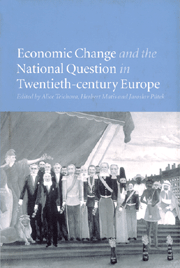Book contents
- Frontmatter
- Contents
- List of figures
- List of tables
- Notes on contributors
- Acknowledgements
- Introduction
- 1 Nationalism and the economic question in twentieth-century Ireland
- 2 Economic aspects of the nationality problem in nineteenth- and twentieth-century Belgium
- 3 The economy as a pushing or retarding force in the development of the German question during the second half of the twentieth century
- 4 Lusatian Sorbs in Germany before the Second World War: the influence of the economy on the national question
- 5 Unequal regional development in Switzerland: a question of nationality?
- 6 The Portuguese national question in the twentieth century: from Spanish threat to European bliss
- 7 From autarky to the European Union: nationalist economic policies in twentieth-century Spain
- 8 The economic background to the Basque question in Spain
- 9 Economic change and nationalism in Italy in the twentieth century
- 10 National integration and economic change in Greece during the twentieth century
- 11 National identity and economic conditions in twentieth-century Austria
- 12 Economic, social and political aspects of multinational interwar Czechoslovakia
- 13 Nationality and competition: Czechs and Germans in the economy of the First Czechoslovak Republic (1918–1938)
- 14 Economic aspects of Slovak national development in the twentieth century
- 15 Economic change and national minorities: Hungary in the twentieth century
- 16 Economic background to national conflicts in Yugoslavia
- 17 Economic differentiation and the national question in Poland in the twentieth century
- 18 Economy and ethnicity in the hands of the state: economic change and the national question in twentieth-century Estonia
- 19 Changing structure and organisation of foreign trade in Finland after Russian rule
- 20 Economic change and the national question in twentieth–century USSR/Russia: the enterprise level
- Index
10 - National integration and economic change in Greece during the twentieth century
Published online by Cambridge University Press: 01 September 2009
- Frontmatter
- Contents
- List of figures
- List of tables
- Notes on contributors
- Acknowledgements
- Introduction
- 1 Nationalism and the economic question in twentieth-century Ireland
- 2 Economic aspects of the nationality problem in nineteenth- and twentieth-century Belgium
- 3 The economy as a pushing or retarding force in the development of the German question during the second half of the twentieth century
- 4 Lusatian Sorbs in Germany before the Second World War: the influence of the economy on the national question
- 5 Unequal regional development in Switzerland: a question of nationality?
- 6 The Portuguese national question in the twentieth century: from Spanish threat to European bliss
- 7 From autarky to the European Union: nationalist economic policies in twentieth-century Spain
- 8 The economic background to the Basque question in Spain
- 9 Economic change and nationalism in Italy in the twentieth century
- 10 National integration and economic change in Greece during the twentieth century
- 11 National identity and economic conditions in twentieth-century Austria
- 12 Economic, social and political aspects of multinational interwar Czechoslovakia
- 13 Nationality and competition: Czechs and Germans in the economy of the First Czechoslovak Republic (1918–1938)
- 14 Economic aspects of Slovak national development in the twentieth century
- 15 Economic change and national minorities: Hungary in the twentieth century
- 16 Economic background to national conflicts in Yugoslavia
- 17 Economic differentiation and the national question in Poland in the twentieth century
- 18 Economy and ethnicity in the hands of the state: economic change and the national question in twentieth-century Estonia
- 19 Changing structure and organisation of foreign trade in Finland after Russian rule
- 20 Economic change and the national question in twentieth–century USSR/Russia: the enterprise level
- Index
Summary
INTRODUCTION
Modern economic development in Greece was a process that unfolded parallel to political and territorial integration of the various regions that were liberated in the process of the breaking up of the Ottoman Empire at different points in time between 1821 and 1948. Perhaps the most critical moment was when, in the wake of the First World War and during the final break-up of the Ottoman Empire, eastern Thrace and the region of Smyrna were placed under Greek control. The age-old irredentist dream of a ‘Great Greece’ extending over ‘two continents and five seas’ and encompassing ancient lands where Hellenism survived and prospered despite repeated conquests from outside, became real. However, it proved a short-lived experience as Turkish nationalism, which had also grown since the end of the nineteenth century, was determined not only to overturn the corrupt and declining empire but also to cleanse it of all foreign economic domination (Greek, Armenian and so on). In 1922, the defeat of Greece by Turkey, after an ill-planned Greek campaign eastwards from Smyrna, resulted in territorial and unprecedented human loss for Greece. Eastern Thrace and the islands of Imvros and Tenedos were lost to Turkey and the Greek populations,which during previous centuries had prospered especially in the Aegean coastal areas of Asia Minor, were expelled or annihilated. Henceforth, Greece's frontiers became fixed and attention was turned towards domestic economic development.
The two processes of nation-building and economic development did not have the same intensity and rhythm.
- Type
- Chapter
- Information
- Publisher: Cambridge University PressPrint publication year: 2000



